193 books about Arts and 7
start with W
193 books about Arts and 7
193 books about Arts
7 start with W start with W
7 start with W start with W
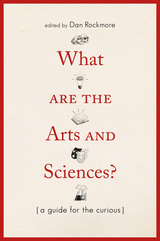
What Are the Arts and Sciences?
A Guide for the Curious
Edited by Dan Rockmore
Dartmouth College Press, 2017
What constitutes the study of philosophy or physics? What exactly does an anthropologist do, or a geologist or historian? In short, what are the arts and sciences? While many of us have been to college and many aspire to go, we may still wonder just what the various disciplines represent and how they interact. What are their origins, methods, applications, and unique challenges? What kind of people elect to go into each of these fields, and what are the big issues that motivate them? Curious to explore these questions himself, Dartmouth College professor and mathematician Dan Rockmore asked his colleagues to explain their fields and what it is that they do. The result is an accessible, entertaining, and enlightening survey of the ideas and subjects that contribute to a liberal education. The book offers a doorway to the arts and sciences for anyone intrigued by the vast world of ideas.
[more]
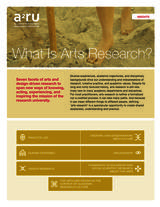
What is Arts Research?
Gabriel Harp
A2RU Intervals, 2018
Seven facets of arts and design-driven research to span new ways of knowing, acting, experiencing, and inspiring the mission of the research university.
Diverse experiences, academic trajectories, and disciplinary backgrounds drive our understanding and interpretations of research, creative practice, and academic values. Despite its long and richly textured history, arts research is still relatively new to many academic departments and disciplines. For most practitioners, arts research is neither a formalized nor a codified process; it can take many paths. And because it can mean different things to different people, defining ‘arts research’ is a spectacular opportunity to create shared awareness, understanding and practice.
Diverse experiences, academic trajectories, and disciplinary backgrounds drive our understanding and interpretations of research, creative practice, and academic values. Despite its long and richly textured history, arts research is still relatively new to many academic departments and disciplines. For most practitioners, arts research is neither a formalized nor a codified process; it can take many paths. And because it can mean different things to different people, defining ‘arts research’ is a spectacular opportunity to create shared awareness, understanding and practice.
[more]
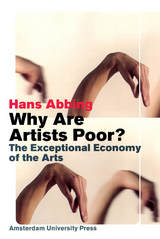
Why Are Artists Poor?
The Exceptional Economy of the Arts
Hans Abbing
Amsterdam University Press, 2002
Most artists earn very little. Nevertheless, there is no shortage of aspiring young artists. Do they give to the arts willingly or unknowingly? Governments and other institutions also give to the arts, to raise the low incomes. But their support is ineffective: subsidies only increase the artists' poverty.
The economy of the arts is exceptional. Although the arts operate successfully in the marketplace, their natural affinity is with gift-giving, rather than with commercial exchange. People believe that artists are selflessly dedicated to art, that price does not reflect quality, and that the arts are free. But is it true?
This unconventional multidisciplinary analysis explains the exceptional economy of the arts. Insightful illustrations from the practice of a visual artist support the analysis.
The economy of the arts is exceptional. Although the arts operate successfully in the marketplace, their natural affinity is with gift-giving, rather than with commercial exchange. People believe that artists are selflessly dedicated to art, that price does not reflect quality, and that the arts are free. But is it true?
This unconventional multidisciplinary analysis explains the exceptional economy of the arts. Insightful illustrations from the practice of a visual artist support the analysis.
[more]
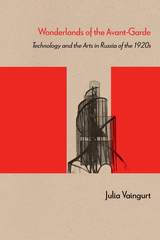
Wonderlands of the Avant-Garde
Technology and the Arts in Russia of the 1920s
Julia Vaingurt
Northwestern University Press, 2013
Longlist finalist, 2015 Historia Nova Prize for Best Book on Russian Intellectual and Cultural History
In postrevolutionary Russia, as the Soviet government pursued rapid industrialization, avant-garde artists declared their intent to serve the nascent state and to transform life in accordance with their aesthetic designs. Despite their utilitarian intentions, however, most avant-gardists rarely created works regarded as practical instruments of societal transformation. Exploring this paradox, Vaingurt claims that the artists’ fusion of technology and aesthetics prevented their creations from being fully conscripted into the arsenal of political hegemony. The purposes of avant-garde technologies, she contends, are contemplative rather than constructive. Looking at Meyerhold’s theater, Tatlin’s and Khlebnikov’s architectural designs, Mayakovsky’s writings, and other works from the period, Vaingurt offers an innovative reading of an exceptionally complex moment in the formation of Soviet culture.
In postrevolutionary Russia, as the Soviet government pursued rapid industrialization, avant-garde artists declared their intent to serve the nascent state and to transform life in accordance with their aesthetic designs. Despite their utilitarian intentions, however, most avant-gardists rarely created works regarded as practical instruments of societal transformation. Exploring this paradox, Vaingurt claims that the artists’ fusion of technology and aesthetics prevented their creations from being fully conscripted into the arsenal of political hegemony. The purposes of avant-garde technologies, she contends, are contemplative rather than constructive. Looking at Meyerhold’s theater, Tatlin’s and Khlebnikov’s architectural designs, Mayakovsky’s writings, and other works from the period, Vaingurt offers an innovative reading of an exceptionally complex moment in the formation of Soviet culture.
[more]
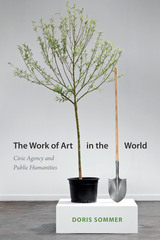
The Work of Art in the World
Civic Agency and Public Humanities
Doris Sommer
Duke University Press, 2014
Celebrating art and interpretation that take on social challenges, Doris Sommer steers the humanities back to engagement with the world. The reformist projects that focus her attention develop momentum and meaning as they circulate through society to inspire faith in the possible. Among the cases that she covers are top-down initiatives of political leaders, such as those launched by Antanas Mockus, former mayor of Bogotá, Colombia, and also bottom-up movements like the Theatre of the Oppressed created by the Brazilian director, writer, and educator Augusto Boal. Alleging that we are all cultural agents, Sommer also takes herself to task and creates Pre-Texts, an international arts-literacy project that translates high literary theory through popular creative practices. The Work of Art in the World is informed by many writers and theorists. Foremost among them is the eighteenth-century German poet and philosopher Friedrich Schiller, who remains an eloquent defender of art-making and humanistic interpretation in the construction of political freedom. Schiller's thinking runs throughout Sommer's modern-day call for citizens to collaborate in the endless co-creation of a more just and more beautiful world.
[more]
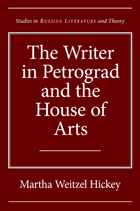
The Writer in Petrograd and the House of Arts
Martha Weitzel Hickey
Northwestern University Press, 2009
Founded by Maksim Gorky and Kornei Chukovsky in 1919 and disbanded in 1922, the Petrograd House of Arts occupied a crucial moment in Russia's cultural history. By chronicling the rise and fall of this literary landmark, this book conveys in greater depth and detail than ever before a significant but little studied period in Soviet literature.
Poised between Russian culture's past and her Soviet future, between pre- and post-Revolutionary generations, this once lavish private home on the Nevsky Prospekt housed as many as fifty-six poets, novelists, critics, and artists at one time, during a period of great social and political turbulence. And as such, Hickey contends, the House of Arts served as a crucible for a literature in transition. Hickey shows how the House of Arts, though virtually ignored by Soviet-era cultural historians, played a critical role in shaping the lively literature of the next decade, a literature often straddling the border between fiction and non-fiction. Considering prose writers such as Yevgeny Zamyatin, Olga Forsh, the Serapion Brothers group, Viktor Shklovsky, Boris Eikhenbaum, as well as poets including Alexander Blok, Nikolay Gumilev, Anna Radlova, Osip Mandelstam, and Vladislav Khodasevich, she traces the comings and goings at the House of Arts: the meetings and readings and lectures and, most of all, the powerful influence of these interactions on those who briefly lived and worked there. In her work, the Petrograd House of Arts appears for the first time in all its complexity and importance, as a focal point for the social and cultural ferment of the day, and a turning point in the direction of Russian literature and criticism.
[more]
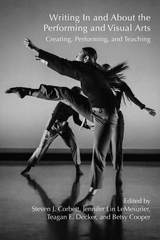
Writing in and about the Performing and Visual Arts
Creating, Performing, and Teaching
Steven J. Corbett
University Press of Colorado, 2020
The performing and visual arts have much to offer writing studies in terms of process, creativity, design, delivery, and habits of mind (and body). This collection is intended for teachers and researchers of writing in and across the disciplines, in both secondary and post-secondary settings, and for those outside of writing studies who wish to infuse more writing into their performing and visual arts curriculums and courses. Filled with evocative images and vivid descriptions, contributors showcase ways of knowing and doing in the performing and visual arts. Contributors also offer teachers in the performing and visual arts go-to practical designs and strategies for teaching writing in their fields.
[more]
READERS
Browse our collection.
PUBLISHERS
See BiblioVault's publisher services.
STUDENT SERVICES
Files for college accessibility offices.
UChicago Accessibility Resources
home | accessibility | search | about | contact us
BiblioVault ® 2001 - 2024
The University of Chicago Press









